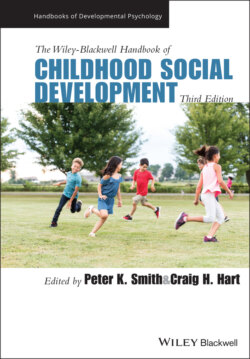Читать книгу The Wiley-Blackwell Handbook of Childhood Social Development - Группа авторов - Страница 40
Childcare
ОглавлениеPrompted by changing economic conditions and cultural mores (e.g., increase in dual‐earner families, feminism; Clarke‐Stewart & Parke, 2014), demand for childcare increased during the 1970s and accelerated thereafter. This movement toward nonparental care precipitated concerns, some of which had implications for children’s social development. Foremost among these concerns were questions about whether sustained nonparental care would disrupt parent–child relations (e.g., alter attachment security; Melhuish, 2001), help vs. hinder children’s self‐esteem, and enhance or impair children’s social competence (Phillips et al., 1987).
Accordingly, prominent research objectives included examining the effects of childcare on children’s emotions (e.g., stress), behaviors (e.g., externalizing behavior), and attachments to parents and teachers (McCartney et al., 2010; NICHD Early Child Care Research Network, 2005). Additionally, researchers sought to estimate childcare quality and identify dimensions associated with better‐quality care (Clarke‐Stewart & Allhusen, 2005; Melhuish, 2001).
The research that was undertaken to address these concerns spanned several decades (the 1980s–present) and, at its peak, included large‐scale, long‐term, government‐funded projects such as the NICHD Study for Early Child Care and Youth Development (NICHD Early Child Care Research Network, 2005). These investigations produced an extensive body of evidence that, collectively, characterized childcare as a context that – under certain conditions – could have positive as well as negative effects on children’s social development. Although findings implied that parent–child attachment typically was not altered by children’s participation in childcare, insecure attachments were evidenced when infants experienced both insensitive parenting and sustained poor‐quality childcare (NICHD Early Child Care Research Network, 2005). Time spent in childcare also emerged as a potential risk factor. Evidence indicated that children who attended childcare for longer intervals (i.e., per day, week, yearly, etc.) were more likely to exhibit disruptive, disobedient, and aggressive behavior (McCartney et al., 2010). High‐quality care, in contrast, was linked with many positive dimensions of children’s social development (e.g., sociability, self‐esteem, emotion regulation, prosocial behavior, compliance; Clarke‐Stuart & Allhusen, 2005; NICHD Early Child Care Research Network, 2005) as well as with children’s long‐term social and emotional adjustment (Vandell et al., 2010).
